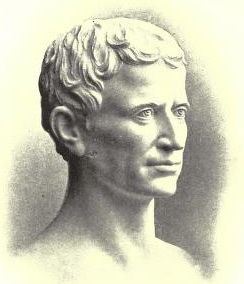Hamlet and Julius Caesar
 Around 1599, Shakespeare took a sudden departure from writing comedies to focus on the darker themes of moral ambiguity and corruption, both of the state and the individual. The result was two of his finest works, Hamlet and Julius Caesar, which share many common elements. Both plays revolve around the grave ramifications of "the cease of majesty." Both Hamlet's father and Caesar return as spirits to demand revenge. Both tragic heroes, Hamlet and Brutus, are philosophical men with high moral ideals who are forced out of their element and into action, but fail to act appropriately; Hamlet due to irresolution and Brutus to self-delusion. One could find many more parallels. Interestingly, Shakespeare alludes to Julius Caesar twice in Hamlet, in 1.1: Around 1599, Shakespeare took a sudden departure from writing comedies to focus on the darker themes of moral ambiguity and corruption, both of the state and the individual. The result was two of his finest works, Hamlet and Julius Caesar, which share many common elements. Both plays revolve around the grave ramifications of "the cease of majesty." Both Hamlet's father and Caesar return as spirits to demand revenge. Both tragic heroes, Hamlet and Brutus, are philosophical men with high moral ideals who are forced out of their element and into action, but fail to act appropriately; Hamlet due to irresolution and Brutus to self-delusion. One could find many more parallels. Interestingly, Shakespeare alludes to Julius Caesar twice in Hamlet, in 1.1:
In the most high and palmy state of Rome,
A little ere the mightiest Julius fell,
The graves stood tenantless and the sheeted dead
Did squeak and gibber in the Roman streets. (113-116)
and in 3.2, when Hamlet asks Polonius what role he played when he was in university:
I did enact Julius Caesar: I was killed i' the
Capitol; Brutus killed me. (105-106)
|
 Around 1599, Shakespeare took a sudden departure from writing comedies to focus on the darker themes of moral ambiguity and corruption, both of the state and the individual. The result was two of his finest works, Hamlet and Julius Caesar, which share many common elements. Both plays revolve around the grave ramifications of
Around 1599, Shakespeare took a sudden departure from writing comedies to focus on the darker themes of moral ambiguity and corruption, both of the state and the individual. The result was two of his finest works, Hamlet and Julius Caesar, which share many common elements. Both plays revolve around the grave ramifications of